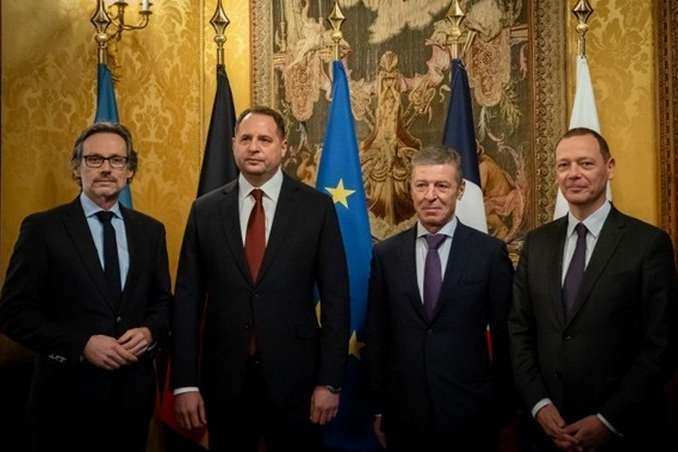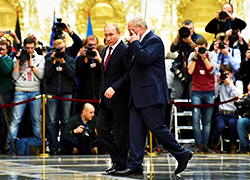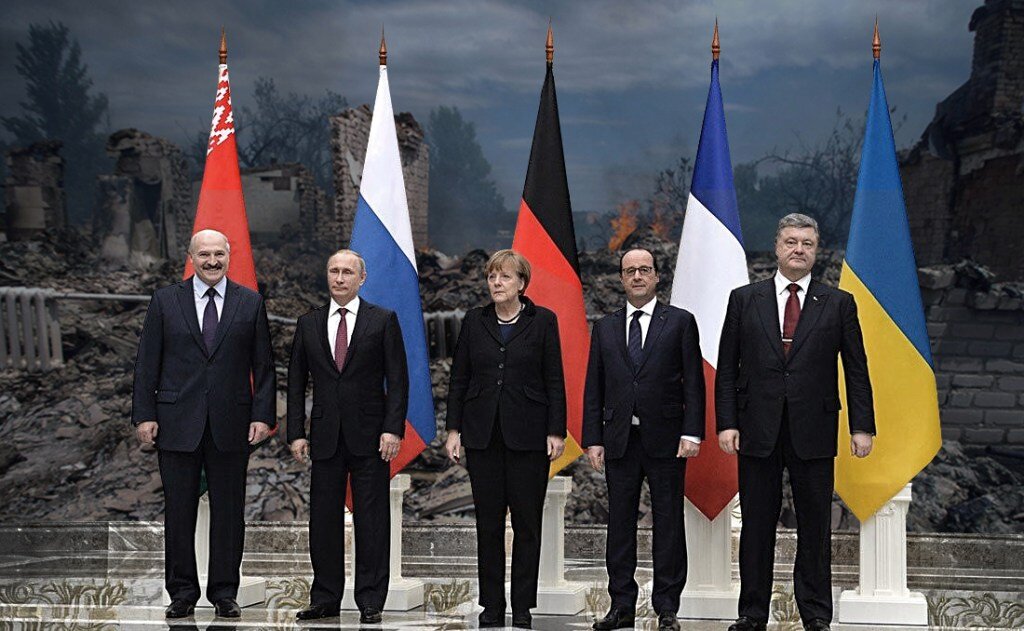On the night of 11 February, a nine-hour Normandy Format meeting ended in Berlin amid continuing tensions between Russia and Ukraine. Like its last gathering on 26 January in Paris, it did not bring any progress, even in the form of a communique.
Normandy talks for Ukraine-Russia conflict resolution resumed. Why was it a win for Russia?
“These were difficult talks in which diverging positions and various options of [conflict] resolution were discovered,” an anonymous from German-French diplomatic circles told Reuters and dpa.
The representatives made a decision to convene for another Normandy meeting, with no day and location confirmed yet. What is clear for now is that parties agreed that the Trilateral Contact Group on Ukraine work should resume.
The Trilateral Contact Group, also TCG or Minsk Group, comprises representatives from Ukraine, Russia, and the Organization for Security and Co-operation in Europe for a diplomatic conflict-resolution in the Donbas region, the eastern part of Ukraine.
In the Berlin meeting, the parties failed to agree upon a joint document, Ukrainska Pravda informs, referring to Andrii Yermak, Head of the Office of the President of Ukraine.
“Today, we could not achieve some joint document. Indeed, these talks lasted for virtually nine hours… It would have been very good if we could come up with something in the second meeting of the Normandy Format after a long pause. There is such a wish, but today, it happened like it happened,” said Yermak.
Key takeaways from the Berlin meeting:
- Renewal of TCG’s work. According to Ukraine’s Foreign Minister Dmytro Kuleba, Ukraine’s key goal at the meeting was to resume the work of the Trilateral Contact Group, Interfax Ukraine reports. “Plan maximum is to unblock the work of the TCG. I see that nothing is moving forward. For that, Russian Federation’s political will is required… If TCG starts work, it will primarily focus on security issues and in case of success, move to humanitarian and gradually advance to political matters. But security remains a number one question,” said Kuleba. He also noted that the security situation in the eastern part of Ukraine had improved since the Paris meeting of 26 January.
- TCG’s competence will include unblocking the work of checkpoints between Ukraine and separatist-controlled territories. The checkpoints will serve to organize the transportation of persons, transport, and cargo across the boundary line.
- The parties view the Minsk Agreements as the basis for their talks.
- TCG will decide on legislation to be worked out under the Minsk Agreements
Ukraine's Minister for Foreign Affairs Dmytro Kuleba said that the talks between the advisers to the leaders of the Normandy format on February 10 were difficult, but the Ukrainian side did not cross any of Ukraine's "red lines."
He said that the key controversy revolved around Russia's insistence that Ukraine holds a direct dialogue with the representatives of the Russian proxy Luhansk and Donetsk "People's Republics," an insistence stemming from Russia's goals to appear not as a side of the conflict, but as its mediator.
Kuleba noted that these talks are very difficult, but must continue "because there is no other way than a diplomatic settlement of the conflict."
"Our only desire now is to unblock the work of the TCG contact group so that we can move forward," Dmytro Kuleba added.
Macron confirms Kyiv scrapped crucial bill upholding Ukraine’s interests to appease Russia
Related:
- Normandy talks for Ukraine-Russia conflict resolution resumed. Why was it a win for Russia?
- Leaked Kremlin emails show Minsk protocol designed as path to Ukraine’s capitulation – Euromaidan Press report
- Minsk-2 is the real problem for Ukraine, not “Steinmeier’s formula” | Infographics
- Minsk protocol and “Steinmeier’s formula” – conflict resolution or conflict conclusion?
- Experts urge to scrap term “Minsk Agreements” as they are not a treaty, use “Protocols” instead
- Zelenskyy’s first Normandy and the illusion of progress
- How Ukraine can escape the trap of the Minsk Protocols and return to international law
- Everything you wanted to know about the Minsk peace deal, but were afraid to ask





